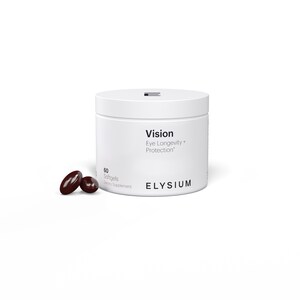NEW YORK, Jan. 9, 2020 /PRNewswire/ -- Elysium Health, Inc.™, a life sciences company developing clinically validated health products based on advancements in scientific research, today announced the initiation of a clinical trial at Duke Clinical Research Institute to study correlations between biological age and circulating NAD+ levels in healthy adults, in addition to other clinical biomarkers that have been implicated in aging. As opposed to marking calendar years, biological age is the average age an individual's body is expected to function and is a powerful measure of overall health and wellness. Biological age will be calculated using Elysium Health's next-generation epigenetic platform, Algorithmic Platform for Epigenetic Examination (APEX), which the company developed to support the 2019 launch of its at-home epigenetic test Index.
Published biological age applications such as DNAm PhenoAge typically look at hundreds of sites on the genome. To ensure greater accuracy at the individual level, Elysium Health head of bioinformatics and Yale School of Medicine professor Dr. Morgan Levine led the development of a proprietary measure that examines global methylation patterns across more than 100,000 sites in collaboration with Elysium Health bioinformatics director Dr. Tina Hu-Seliger. A key consideration for developing the methodology that underlies APEX and Index was the need to refine the technology to address the inherent variability of earlier epigenetic age predictors. Later this year, Elysium Health intends to publish the data that supports its methodology, and which demonstrates that Index is a better predictor of biological age than earlier measures.
As an essential coenzyme involved in hundreds of metabolic processes, NAD+ is critical to cellular metabolism; and its reduced form, NADH, is required for mitochondrial metabolism and the resulting synthesis of ATP for cellular energy creation. NAD+ is also utilized by sirtuins, often referred to as the "guardians of the genome." NAD+ levels have been shown to decline with age in humans in circulating blood as well as skin and brain tissue. Although the underlying causes for deteriorating NAD+ levels have not yet been fully determined, understanding correlations between epigenetic aging and NAD+ levels may help elucidate the benefits of maintaining NAD+ levels with age.
"Over the past decade, epigenetic tests have evolved to measure biological age with an increasing level of accuracy," said Elysium Health chief scientist and director of the Glenn Center for Biology of Aging Research at MIT Dr. Leonard Guarente. "Having studied aging for more than 30 years, it's my belief that the field is at a tipping point. The newfound ability to measure biological age allows us to study whether interventions can have an impact, thus unlocking the potential to realize the benefits of aging research in our lifetime."
This study is intended to further the understanding of the links between NAD+ levels and other markers of biological age. In the study, NAD+ levels in whole blood, interleukins, inflammatory cytokines, growth factors, omega-3 polyunsaturated fatty acids, and patterns in DNA methylation will be measured and compared in age-matched individuals to determine whether NAD+ levels are associated with biological age.
One hundred and seventy healthy adults ages 25–80 will be enrolled in the study, which is scheduled to complete in May 2020. More information can be found on www.clinicaltrials.gov under the identifier NCT04220658.
About Elysium Health™
Elysium Health's™ mission is to solve the biggest challenges in health with science, to help people lead healthier lives. Working directly with the world's leading scientists and clinicians, Elysium Health™ is committed to translating critical advancements in scientific research into health solutions people can access today. Learn more at www.elysiumhealth.com.
SOURCE Elysium Health

Related Links
WANT YOUR COMPANY'S NEWS FEATURED ON PRNEWSWIRE.COM?
Newsrooms &
Influencers
Digital Media
Outlets
Journalists
Opted In





Share this article